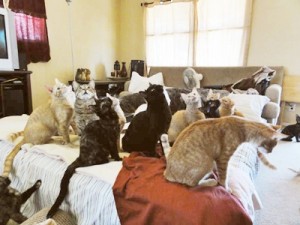Rarely do you hear of a male “crazy cat” person that hoards cats.
Why is it usually women that hoard the cats? “It may be a sign of mental illness, such as obsessive compulsive disorder, dementia, or anxiety, or a mental illness itself”. – ASPCA.
Many women fall victim to good intentions and “end up emotionally overwhelmed, socially isolated, and ultimately alienated from family and friends. This behavior frequently begins after an illness, disability or death of a significant other, or another difficult life event such as a trauma during their youth.” -ASPCA. Since men tend to pass on average five years earlier than women, this leaves a lot more single widows with a need for affection and attachment.
The term “animal hoarding” refers to the compulsive need to collect and own animals for the sake of caring for them that results in accidental or unintentional neglect or abuse. Many times the cats are acquired passively, as word gets out that there is a no-kill place that will accept cats.
Compared to dogs, “cats are certainly very easy to acquire, and… they’re much easier to keep and hide.” – Dr. Patronek, founder of Hoarding of Animals Research Consortium. In a study of 54 US hoarding cases, “Patronek found that about two-thirds of hoarders are solitary women and nearly half are 60 or older”.
One recent example was the president of a Cary, NC 501(c)3 animal rescue called “Calvin’s Paws.” She was arrested with approx. 100 cats in her home. To paint a picture of what caring for 100 cats would look like:
50 cat food dishes (where would you put them all)?
35 cat boxes (where would you put them all)? No more than 3 cats to a litter box
25 water bowls
100 beds (each cat needs its own “territory”even if that is just a place to rest its head)
A second woman arrested last week had 150 cats in a 1200 square ft row house. That means there were only 8 square feet per cat. That does not allow for furniture, bathroom and kitchen appliances, counter space or walls.
If a bag of cat food on sale costs $12 and feeds 12 cats, you would need 13 bags of food per day to feed all of these furry creatures at a total cost of: $156. That’s $1,092 per week, or $4,368 per month just on food. This doesn’t include the cost of cat litter, or the water bill.
What about getting the cats fixed? One un-neutered male could impregnate all the unspayed females, and with an average litter size of 5 kittens, there could be 20-50 more cats within the year.
The third recent case in North Carolina involved yet another woman: “A 51-year-old Mount Airy woman was found guilty of 46 counts of animal neglect Tuesday after 119 living cats, and at least 100 more dead ones, were found in her squalid home.” – Fox News.
They also reported the following disturbing facts:
• Every year 3,500 animal hoarders come to the attention of authorities
• At least 250,000 animals are affected each year
• Seventy percent of animal hoarders who come to the attention of authorities are females who are single, widowed, or divorced; although community-sampling studies find an equal ratio of males to females
• Eighty percent of animal hoarders have diseased, dying, or dead animals on the premises.
Unfortunately, the crazy cat woman is more common than we want to believe. If you know of a neighbor or family member that has a large number of cats in their care, here is an organization that can help:
1. The OCD Foundation (Obsessive Compulsive Disorder) website-
http://www.ocfoundation.org/
2. The ADAA Foundation (Anxiety and Depression Association of America) website –
http://www.adaa.org/












Speak Your Mind